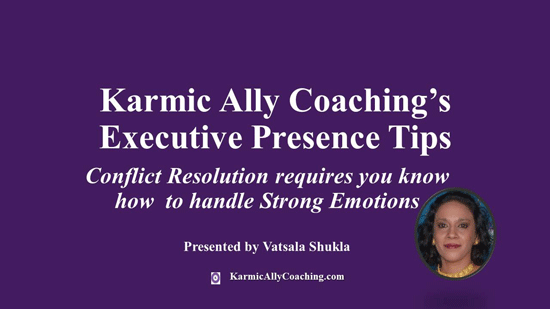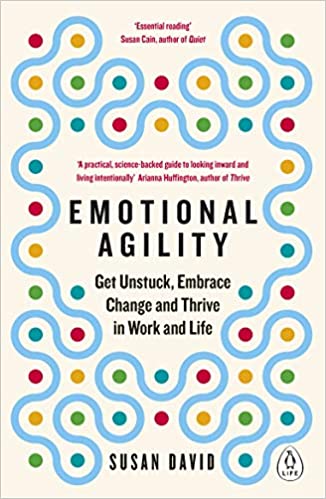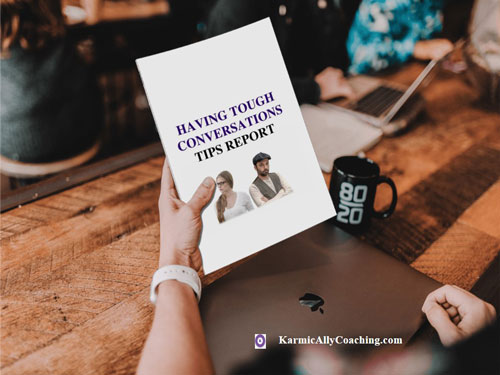This post has already been read 702 times!

Do strong emotions affect the way you manage conflicts whether in the workplace or at home?
If you nodded in agreement, then take heart.
Even for the most seasoned pros, resolving conflict can still bring up some powerful emotions.
Have you ever wondered why this happens and how you can avoid getting sucker-punched by your feelings while you are trying to fix a tricky situation?
Hi, I’m Vatsala Shukla, Chief Encouragement Officer at Karmic Ally Coaching. In this presentation, I’ll be discussing how to manage strong emotions when dealing with conflict.
Your composure or lack of it impacts people’s perception of your having Gravitas and a level of Emotional Intelligence. These in turn impact how others perceive your Executive Presence.
Strong Emotions & Conflict Resolution: Prefer to read? Here’s the transcript
Conflicts inherently come from an emotional place. It is vital you practice self-awareness, know how to control your feelings and resolve them successfully.
Understanding Conflict
To begin with, let us try to understand conflict is.
Conflicts come from differences between two or more people. You may disagree over goals, perceptions, needs, ideas, or values, and this rift triggers an emotional response because the other person is threatening something we hold very dear to us.
It may not even be the differing ideas or goals that are the real source of the problem; instead, it is about what these differences mean to having your need for safety, understanding, respect, acceptance, or another emotional requirement fulfilled.
These unmet needs are the real source of conflict, and because they are connected to our emotional health, we feel them very strongly when they are under threat.
The most common emotions that are activated during a conflict are anger and fear, which can manifest in many different ways.
It could be your body language sending out combat signals, that knee jerk email that you can’t recall. Or even shouting at the other person which goes against you even though you may be right about the issue. Think about it. Has this ever happened to you?
When you’re in the middle of a conflict, it’s common to automatically enter into a “fight or flight” mentality.
You experience an adrenalin rush. If you’re not able to control it or aren’t aware of what’s happening to you, you end up reacting rather than responding in an emotionally intelligent manner.
So let’s first understand and then manage our emotions during conflict.
Understanding and Managing Emotions during Conflict
In my blog post Conflict Management can be easy and without losing one’s mind, I recommended focusing on the issue.
It’s easier said than done when our emotions come into the picture.
One of the most important steps in managing your emotions to resolve a conflict is first identifying them and understanding their source.
Getting in touch with your anger or fear (or sadness or whatever else you are feeling) is vital.
Until you know what you are feeling and why, you cannot possibly hope to get your feelings under control. Doing this outside of the conflict situation is imperative.
You cannot rationally discuss a problem with someone else while simultaneously trying to work out why you are feeling the way you do.
It is also helpful to look at how this emotion has influenced you in the past, and if those actions were productive.
When you’ve been angry before, did you lash out physically or use your words to demean someone else?
What were the consequences of your hostile actions, and why would you have or rather what would you have done differently?
Recognizing the emotions of the other person’s also essential. Why do they feel the way they do, and how are their emotions influencing their actions?
Use the exercise of perceptual positions to get a feel of the other person’s point of view. And above all, don’t let your emotions feed the other person’s emotions. Maintain composure and don’t allow the other person know how you’re getting upset.
This will help you to find a win-win solution.
Understand your Emotional Buttons
Understanding your emotional “buttons” is crucial to making sure that your emotions do not take over when you are trying to resolve your problem.
What are the issues, comments, or actions that are most likely to make you upset or feel frustrated? When you hear or see these things, what can you do instead to minimize your emotional response to them?
Once you know your trigger points, it’s easier to manage your response to them and not feel blindsided when they come up during conflict.
In fact, I usually ask my clients about the trigger points when they mention that they got upset or they lost their cool. And normally, it turns out that there is something else going on in the background.
Acknowledge and Label your Feelings
I recommend that you acknowledge and label your feelings.
And this comes from Susan David, who’s the author of Emotional Agility, who points out that when you’re feeling emotional, the attention you give your thoughts and feelings crowd your mind and there’s no room to examine them. And you have to distance yourself from the feeling and label it. Call a thought a thought and an emotion an emotion.
You see, labelling allows you to see your thoughts and feelings for what they are: the transient sources of data that may or may not prove helpful. And when you put that space between these emotions and you, it’s easier to let them go — and not bury them or let them explode.
What’s Your physical response?
Becoming more aware of your physical response to emotions can also help you get a handle on them in times of stress. When you are upset or angry, what happens to your pulse? How does your stomach feel? What sensations do you notice in other parts of your body?
The more you are aware of these responses, the better you will be able to recognize them as they are starting to build up rather than waiting until you are in full-blown reaction to begin to de-escalate.
Other ideas to handle strong Emotions
I have some other ideas that can help you to handle strong emotions. Mindfulness and breathing strategies can help to calm you when your emotional response kicks in.
You can use the power of mantras or affirmations to calm yourself down. You can try saying ‘all is well’ or ‘this is not me/ about me’. Or anything else that can help you to calm down in the moment. You can also try tapping your collar bone just below the neck to release any pent up emotion.
Learning how to talk about your feelings and the unmet needs can help you to resolve your problems.
And, without blaming, you should be able to express to the other person how their actions or beliefs are actually making you feel, and you should also practice listening to their responses, which can give insight into the situation.
If nothing else, request a break and stretch your body or simply stand up and walk a bit.
Another technique that I find works well is to touch each finger with the thumb until one feels calm. And this is one that I have actually tried before and I suggest it. Nobody would even know what’s going on.
Extra Resource: Having Tough Conversations Tipsheet
I have an extra resource that will help you, especially when you’re having tough conversations and can help you to avoid conflict. The link to my special report Having Tough Conversations is given below this video.
So having shared all of that, I’d like to leave you with a quote and a question.
The quote is from Frederick Lenz and it’s very true.
“Learn to control your emotions. Be able to glide through them. By practicing concentration exercises and meditation, you will find that when strong emotions strike, you will gain the ability to not be swayed by them.”
And overall, becoming more emotionally aware will help you avoid feeling ambushed by your feelings while also learning to channel them productively into finding a resolution to your source of conflict.
That’s all from me for now but I’d like to leave you with a question, for you to consider and perhaps even leave me with a reply.
That is, which tip will you apply first the next time you’re experiencing strong emotions during a conflict situation?
With that, I leave you to reflect on this question. I’m Vatsala Shukla from Karmic Ally Coaching signing off. Bye for now.





 I adhere to the Certified Coaches Alliance Code of Ethics and Standards. A copy is available on request.
I adhere to the Certified Coaches Alliance Code of Ethics and Standards. A copy is available on request.
 Let's Talk through the Connect Form:
Let's Talk through the Connect Form: